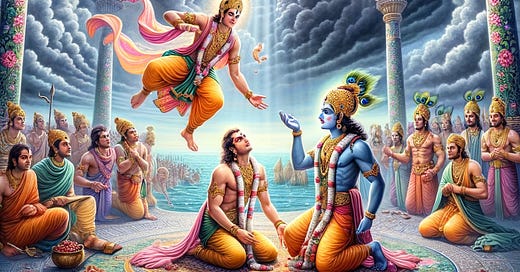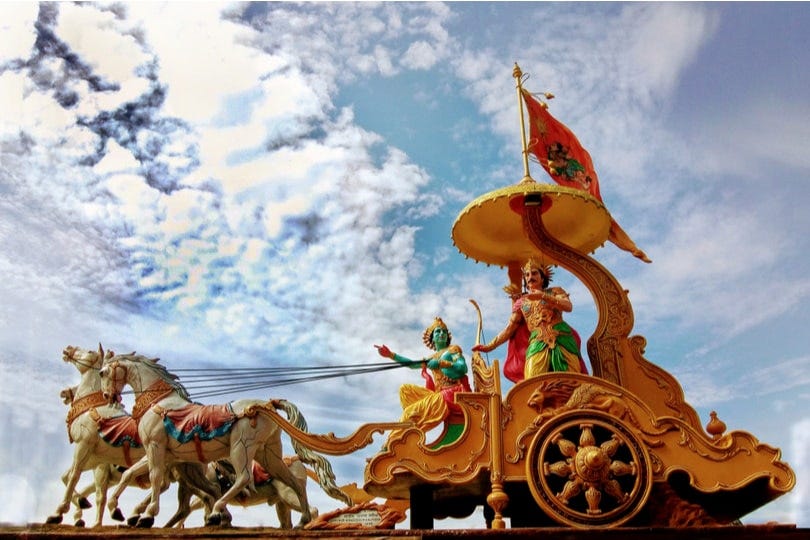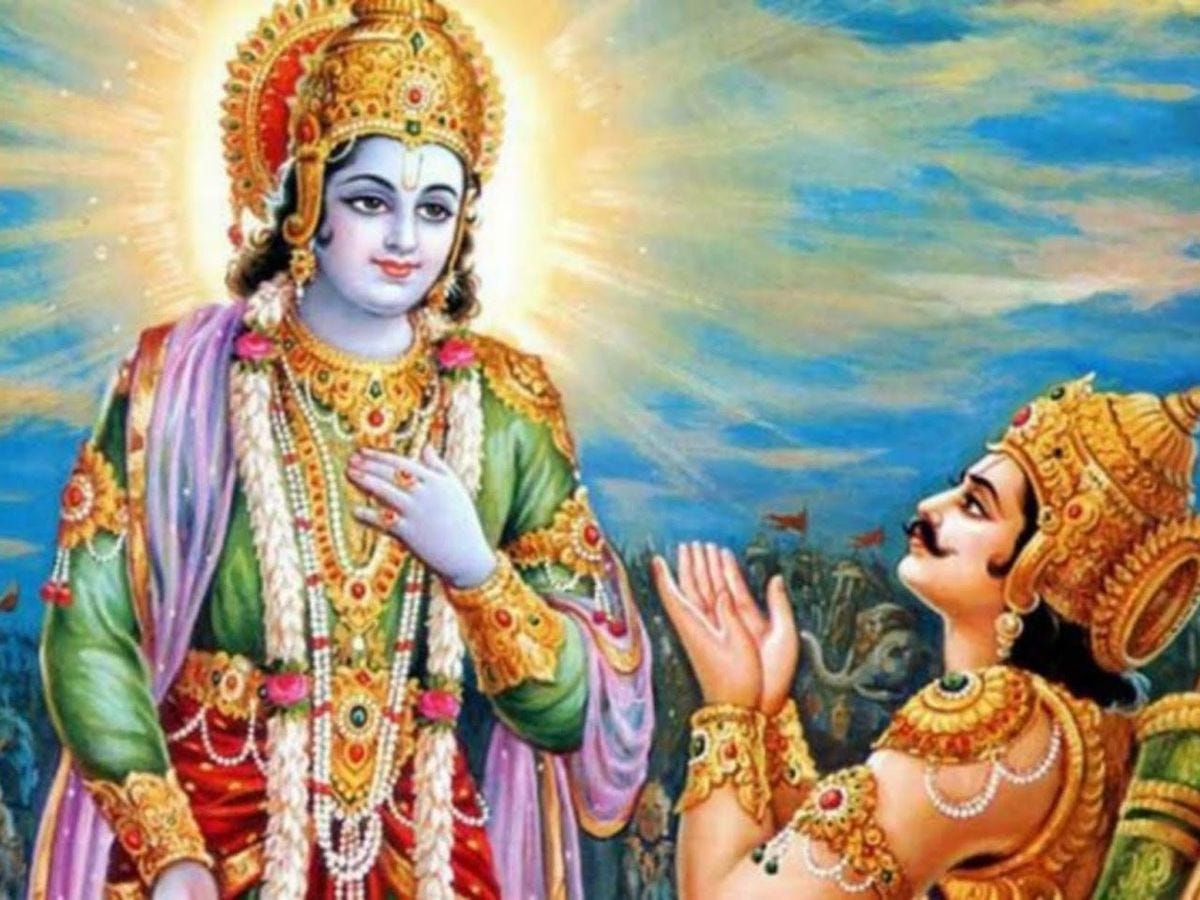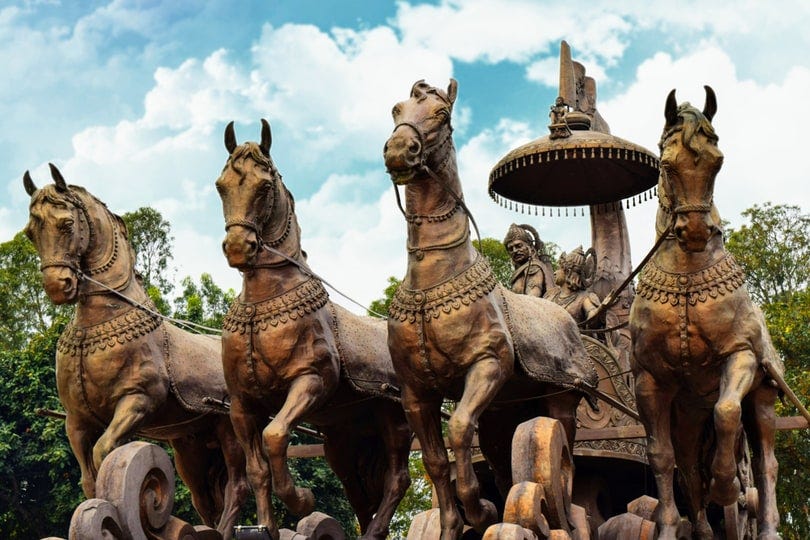Gita Jayanti-2023: The Essence of the Last Verse of Bhagavad Gita
A text-cum-video interpretation of the last verse of the holy Bhagavad Gita, believed to encapsulate the essence of this divine scripture.

Gita Divas: A Day of Reflection
Gita Jayanti in 2023, being observed on Friday, 22nd December, holds a significant place in broader Hinduism as it commemorates the anniversary of the Bhagavad Gita. This day falls on the Ekadashi (eleventh day) of the Shukla Paksha (waxing moon) in the Hindu month of Margashirsha, typically aligning with November or December. Gita Jayanti celebrates the profound spiritual discourse given by Lord Krishna to Arjuna on the battlefield of Kurukshetra, as documented in the Bhagavad Gita. The observance of this day is not just a remembrance of the Holy Gita's origin but also an opportunity for devotees to reflect on its enduring teachings and their relevance in modern life. Celebrations of Gita Jayanti typically include group pujas, collective prayers, recitations, and insightful discourses on the Gita. Additionally, ablutions in sacred sarovars, particularly in Kurukshetra, are a significant ritual. These practices serve as a profound reminder of the scripture's teachings on righteous living and the path to spiritual enlightenment.
The Last Verse: Essence of the Bhagavad Gita
The Bhagavad Gita, often revered as the Holy Gita, is an integral part of the great Indian epic Mahabharata, comprising just 700 verses (shalokas) or 1400 lines, as a shalok is essentially a couplet. It presents a profound dialogue between the Pandava warrior prince Arjuna and Lord Krishna, who assumes the role of his charioteer. Set against the backdrop of the imminent Battle of Kurukshetra, this scripture delves into Arjuna's moral and philosophical conflicts and moral dilemmas. Lord Krishna, an incarnation of Lord Vishnu, imparts timeless spiritual wisdom and guidance. The teachings of the Gita transcend the battlefield's circumstances, offering enduring and universal principles for righteous living that continue to resonate with humanity across ages.
Insights from the Last Verse
A couple of years ago, I recorded a video offering my humble interpretation of the last verse of the Bhagavad Gita, which I believe encapsulates the essence of this holy scripture. This verse not only provides a summary of the Gita's teachings but also offers guidance for civilization and mankind on achieving sustainable peace and long-term prosperity.
The last verse, found in Chapter 18, Verse 78, reads:
In Sanskrit:
यत्र योगेश्वरः कृष्णो यत्र पार्थो धनुर्धरः।
तत्र श्रीर्विजयो भूतिर्ध्रुवा नीतिर्मतिर्मम॥
Transliteration: (Yatra yogeśvaraḥ kṛiṣhṇo yatra pārtho dhanur-dharaḥ/ tatra śhrīr vijayo bhūtir dhruvā nītir matir mama.)
English Translation: "Wherever there is Krishna, the Lord of all Yoga, and wherever there is Arjuna, the supreme archer, there will also certainly be unending opulence, victory, prosperity, and righteousness. I am of this opinion."
Paraphrase and Interpretation of the Video
In my brief 7-minute video, I explore the profound implications of the Bhagavad Gita's final verse, highlighting the synergistic presence of Lord Krishna and Arjuna. This combination, representing the fusion of divine guidance and dynamic human endeavour, signifies the potential for not just tangible wealth and triumph but also a deeper, more enduring prosperity and ethical integrity. This verse is emblematic of overcoming societal challenges like poverty, ill health, and illiteracy, underlining the necessity for policies that prioritize the wellbeing of people.
Drawing parallels between the Gita's teachings and good governance, I submit that societal welfare flourishes when spiritual principles inform both state policies and pragmatic actions. The balance between spirituality, as embodied by Krishna, and action, as represented by Arjuna, is crucial. I contend that spirituality alone might be insufficient for societal guidance, and action devoid of spiritual underpinnings could lead to turmoil and devastation.
As the video concludes, I ponder the contemporary relevance of these teachings, stressing the importance for societies to integrate spiritual values with effective, altruistic action for the collective benefit. I encourage the audience to engage with and ponder these ancient yet timeless insights, emphasizing the Bhagavad Gita's continued significance in guiding both personal growth and societal advancement.
The above summary encapsulates the core themes of my video, focusing on merging spiritual wisdom with actionable strategies as crucial for the prosperity and ethical advancement of society.
Summary of the Video Transcript
As requested by viewers, I have extracted text from your YouTube video on the last verse of the Bhagavad Gita:
As mentioned before, the video commences with the recitation of the verse, in Sanskrit, from Bhagavad Gita, "yatra yogeśvaraḥ kṛiṣhṇo yatra pārtho dhanur-dharaḥ, tatra śhrīr vijayo bhūtir dhruvā nītir matir mama".
I then sequentially discuss, in English:
The significance of this being the last verse of the Bhagavad Gita, Chapter 18, Verse 78.
The interpretation of Lord Krishna as Yogeshwar, the Lord of yoga, and Arjuna as Partha, the son of Pritha, holding his bow poised for action.
The implications of their presence together, bringing opulence (śhrī), victory (vijayo), prosperity (bhūti), and constant righteousness (dhruva nīti).
The victory is described as overcoming poverty, ill health, hatred, and illiteracy.
The use of the word "dhruva" for constant, unchanging, or unending, linking it to the Dhruv Tara (North Star) and a quote from Julius Caesar.
The alternative interpretation of 'niti' as stable policy aimed at the welfare and righteousness of the people.
Sanjaya, as the narrator of the Bhagavad Gita, providing these insights to the blind King Dhritarashtra.
The conclusion of the Bhagavad Gita as the battle is about to begin, with Sanjaya expressing his opinion on the outcome.
The application of these teachings to Raj Dharma, governance and public administration, policy-making, and civilization.
The importance of balancing spiritualism with action.
The need for society to adopt the teachings of the Bhagavad Gita for prosperity, victory, and righteousness.
I conclude the video by emphasizing the universal and timeless wisdom of the Bhagavad Gita and its relevance to human civilization and societal betterment.
A Key to Civilizational Progress
In conclusion, the teachings of the Bhagavad Gita, particularly highlighted in its last and climatic verse, offer a key to civilizational progress. They accentuate the need for a proper balance between dynamic action and egalitarian policies, aimed at the greatest good of mankind and the planet. This ancient wisdom, when applied in modern contexts, has the potential to guide humanity towards a more harmonious and prosperous future, especially in a world torn between hunger, poverty, strife and war.
To gain a more comprehensive understanding and to watch my detailed interpretation of this significant verse, please double-click on the icon below, which will direct you to the video on YouTube.










Power of divine love.